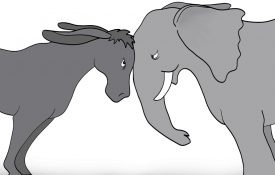-
5 Reasons Giving Thanks Can Improve Your Life
New York Magazine: If you’re older than 9, it’s hard to resist the urge to roll your eyes when someone at the Thanksgiving table suggests, "Let’s all go around the room and share what we’re thankful for!" It’s a pretty corny holiday ritual you mostly do to keep your mom or your most momlike friends happy, but a robust body of psychological research actually links these sorts of gratitude exercises with increased happiness, health, and overall well-being. In other words, there are some very practical reasons to get into the spirit of things tomorrow by taking a minute to remember the reasons you’re #blessed. These are lessons that can be applied year-round.
-
How to talk like you’re in charge
The Boston Globe: WHAT IS THE SOUND of power? Well, it’s high-pitched and monotonous, and alternately loud and soft. In a study, men and women were told they would be involved in a negotiation exercise, were put in a low- or high-power frame of mind, and then read a negotiation statement out loud. Those who were put in a high-power frame of mind spoke differently (higher pitch, more variable loudness, more monotone) than those who were put in a low-power frame of mind. Moreover, other people who later listened to recordings of these speakers—without knowing which speakers had been assigned to which frame of mind—were able to accurately guess which speakers were in a powerful role.
-

People Trust Typical-Looking Faces Most
Being “average” is often considered a bad thing, but research suggests that averageness wins when people assess the trustworthiness of a face.
-

Political Extremists Are Less Susceptible to Common Cognitive Bias
People who occupy the extreme ends of the political spectrum may be less influenced by outside information on a simple estimation task than political moderates.
-
Examining Flip Side Of A Firm’s Social Responsibility Record
NPR: Goldman Sachs has given hundreds of millions of dollars to charity in recent years. In part, its effort to do good has been shaped by the battering its reputation took during the financial meltdown in 2008 when Goldman traders were accused of misleading investors. The efforts of companies to look good in the public eye may seem positive but there is also a disturbing side of doing good work, as NPR's social science correspondent Shankar Vedantam tells our own Steve Inskeep. ... I'm not going to tell you it's a bad idea, Steve. But I will say that it comes at a risk. I spoke with Elaine Wong.
-
Wheat People vs. Rice People
The New York Times: AMERICANS and Europeans stand out from the rest of the world for our sense of ourselves as individuals. We like to think of ourselves as unique, autonomous, self-motivated, self-made. As the anthropologist Clifford Geertz observed, this is a peculiar idea. People in the rest of the world are more likely to understand themselves as interwoven with other people — as interdependent, not independent. In such social worlds, your goal is to fit in and adjust yourself to others, not to stand out. People imagine themselves as part of a larger whole — threads in a web, not lone horsemen on the frontier. In America, we say that the squeaky wheel gets the grease.

